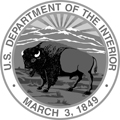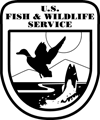
United States Department of the Interior
FISH AND WILDLIFE SERVICE
5600 American Boulevard West, Suite 990
Bloomington, Minnesota 55437-1458

IN REPLY REFER TO:
FWS/R3/ES
April 20, 2015
Mr. David Valenstein
Division Chief, Environmental and Corridor Planning
Office of Program Delivery
USDOT Federal Railroad Administration
1200 New Jersey Avenue SE, MS-20, W38-314
Washington, D.C. 20590
Mr. Gerry Solomon
Director, Office of Project Development
& Environmental Review
USDOT Federal Highway Administration
1200 New Jersey Avenue SE, Rm E76-326
Washington D.C. 20590
Re: Request for Concurrence on the Range-wide Programmatic Informal Consultation on Impacts of Some Transportation Projects on the Indiana Bat and Northern Long-eared Bat
Dear Mr. Valenstein and Mr. Solomon:
This responds to your April 17, 2015 request for our concurrence that select Federal Highway Administration (FHWA) Federal Aid and Federal Lands Highway Program activities and rail improvements funded or authorized by the Federal Railroad Administration (FRA), are not likely adversely affect the endangered Indiana bat (Myotis sodalis) and the threatened northern long-eared bat (Myotis septentrionalis) under Section 7(a)(2) of the Endangered Species Act (ESA), as amended (87 Stat. 884, as amended; 16 U.S.C. 1531 et seq.; ESA).
As discussed in your letter, staffs from the FHWA, FRA, and U.S. Fish and Wildlife Service (Service) have been coordinating on a programmatic informal consultation for select transportation activities. This informal consultation includes conservation measures outlined in your April 16, 2015 document entitled “Range-wide Biological Assessment for Transportation Projects for Indiana Bat and Northern Long-eared Bat,” to be used to design projects to avoid adverse effects to bats, thus achieving a “may affect, not likely to adversely affect” determination for Section 7 consultation for these projects. This programmatic informal consultation only addresses the consultation requirements for those projects that can implement the conservation measures and meet the project conditions and effect determinations described in the biological assessment. The Service was a part of, and worked to help construct the biological assessment, including all analysis and design of conservation measures. Therefore, based on the analysis in the biological assessment, we concur that all projects designed to fully meet the required terms will only have effects on northern long eared bat and Indiana bat that are insignificant (unlikely to rise to the level of take), discountable (take is extremely unlikely to occur), or wholly beneficial.
Under the terms of this programmatic informal consultation, the FHWA, FRA, and State Departments of Transportation (DOTs) are responsible for ensuring submitted projects are within the scope of, and adhere to the criteria of the programmatic Biological Assessment. FHWA, FRA, and State DOTs will submit project information (single projects or multiple “batched” projects) to the appropriate Service Ecological Services Field Office prior to project initiation for verification by the Service. However, the FHWA, FRA or State DOT may proceed under the terms of the programmatic informal consultation if they do not receive a written (hard copy or e-mail) notification to the contrary. More information on the
notification process and other steps for implementation of the programmatic informal consultation will be provided in a “user guide” jointly developed by FHWA, FRA, and the Service.
The programmatic informal consultation agreement will be in effect from the date of this letter until we receive information that indicates the consultation must be revised. To track and monitor the consultation, FHWA and the Service will meet on an annual basis, or as needed, to: (1) discuss the annual report of covered projects, (2) evaluate and discuss the continued effectiveness ofthe programmatic consultation, and (3) update procedures, conservation measures, or project criteria, if necessary. If through this review process, FHWA, FRA, or the Service believes that this programmatic informal consultation is not being implemented as intended or is having unanticipated impacts on the species, they may request formal review and possible revision.
We applaud your commitment to protect both bat species and the collaborative approach of each of the participating federal agencies. With the completion of this programmatic informal consultation, we look forward to our continued collaboration on your conservation strategy and formal consultation approach for the bats. If the project description changes or new information reveals that the effects of the proposed action may affect listed species in a manner or to an extent not considered, further review pursuant to the ESA may be required. If you have any questions or need further information, please contact Forest Clark, at the Service's Bloomington Indiana Field Office at 812-334-4261 ext. 1206.
Sincerely,

Lynn Lewis
Assistant Regional Director, Midwest Region
Enclosure
cc: Paul Phifer, USFWS, ARD Ecological Services, Northeast Region
Leo Miranda, USFWS, ARD Ecological Services, Southeast Region
← Return to report

